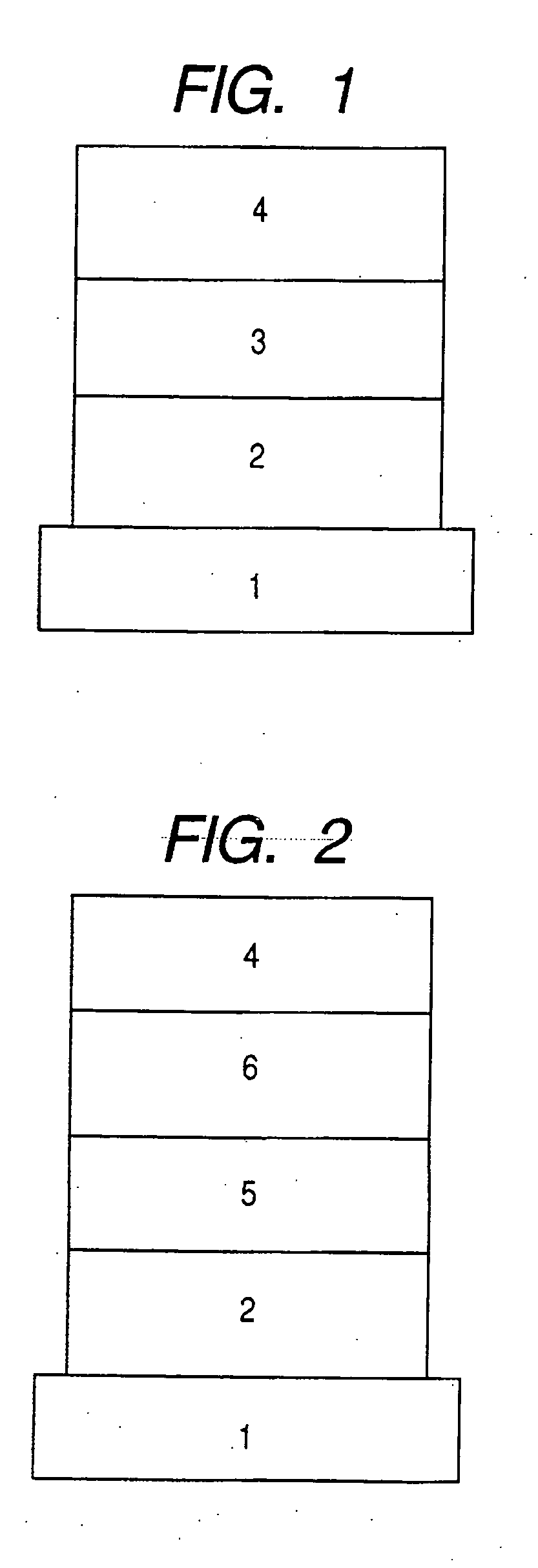1,8-Naphthyridine compound and organic light-emitting device using the same
- Summary
- Abstract
- Description
- Claims
- Application Information
AI Technical Summary
Benefits of technology
Problems solved by technology
Method used
Image
Examples
synthesis example 1
Synthesis of Exemplified Compound No. 6
[0069]
[0070] 2,7-dichloro-1,8-naphthyridine [5] (white crystal) was obtained from the above compound [1] in a total yield of 9.6% according to the synthesis method described in J. Org. Chem., 46, 833 (1981).
[0071] 1.0 g (5.78 mmol) of 2,7-dichloro-1,8-naphthyridine [5], 4.1 g (17.3 mmol) of 9,9-dimethylfluorene-2-boronic acid [6], 200 ml of toluene, and 100 ml of ethanol were loaded into a 500-ml three-necked flask. An aqueous solution prepared by dissolving 24 g of sodium carbonate into 120 ml of water was dropped to the mixture while stirring under a nitrogen atmosphere at room temperature. Next, 0.33 g (0.29 mmol) of tetrakis(triphenylphosphine)palladium (0) was added to the mixture. After the mixture had been stirred at room temperature for 30 minutes, the temperature of the mixture was increased to 77° C., and the mixture was stirred for 4 hours. After the reaction, an organic layer was extracted with chloroform, dried with anhydrous sod...
synthesis example 2
Synthesis of Exemplified Compound No. 13
[0072]
[0073] 1.0 g (5.78 mmol) of 2,7-dichloro-1,8-naphthyridine [5], 3.2 g (14.5 mmol) of Phenanthene-9-boronic acid [7], 200 ml of toluene, and 100 ml of ethanol were loaded into a 500-ml three-necked flask. An aqueous solution prepared by dissolving 20 g of sodium carbonate into 100 ml of water was dropped to the mixture while stirring under a nitrogen atmosphere at room temperature. Next, 0.33 g (0.29 mmol) of tetrakis(triphenylphosphine)palladium (0) was added to the mixture. After the mixture had been stirred at room temperature for 30 minutes, the temperature of the mixture was increased to 77° C., and the mixture was stirred for 4 hours. After the reaction, an organic layer was extracted with chloroform, dried with anhydrous sodium sulfate, and purified with a silica gel column (mixed developing solvent of toluene and ethl acetate), whereby 2.1 g of Exemplified Compound No. 13 (white crystal) were obtained (77% yield).
synthesis example 3
Synthesis of Exemplified Compound No. 38
[0074]
[0075] 3,6-dibromo-1,8-naphthyridine [8] (white crystal) was obtained in a total yield of 23% according to the synthesis method described in J. Heterocyel. Chem., 13, 961 (1976).
[0076] 1.0 g (3.47 mmol) of 3,6-dibromo-1,8-naphthyridine [8], 2.5 g (10.4 mmol) of 9,9-dimethylfluorene-2-boronic acid [6], 200 ml of toluene, and 100 ml of ethanol were loaded into a 500-ml three-necked flask. An aqueous solution prepared by dissolving 20 g of sodium carbonate into 100 ml of water was dropped to the mixture while stirring under a nitrogen atmosphere at room temperature. Next, 0.20 g (0.17 mmol) of tetrakis(triphenylphosphine)palladium (0) was added to the mixture. After the mixture had been stirred at room temperature for 30 minutes, the temperature of the mixture was increased to 77° C., and the mixture was stirred for 4 hours. After the reaction, an organic layer was extracted with chloroform, dried with anhydrous sodium sulfate, and purifi...
PUM
| Property | Measurement | Unit |
|---|---|---|
| Electric potential / voltage | aaaaa | aaaaa |
| Electric potential / voltage | aaaaa | aaaaa |
| Current density | aaaaa | aaaaa |
Abstract
Description
Claims
Application Information
 Login to View More
Login to View More - R&D
- Intellectual Property
- Life Sciences
- Materials
- Tech Scout
- Unparalleled Data Quality
- Higher Quality Content
- 60% Fewer Hallucinations
Browse by: Latest US Patents, China's latest patents, Technical Efficacy Thesaurus, Application Domain, Technology Topic, Popular Technical Reports.
© 2025 PatSnap. All rights reserved.Legal|Privacy policy|Modern Slavery Act Transparency Statement|Sitemap|About US| Contact US: help@patsnap.com



